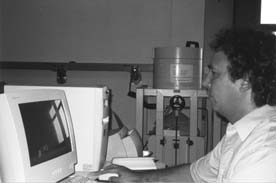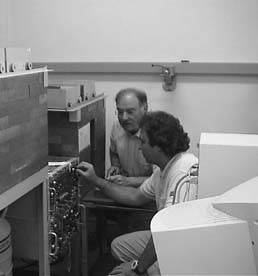Personal tools
News from ICTP 98 - Features - C Alonso H

ICTP'S TRIL programme teams with Italian universities and research centres to help scientists from the developing world gain valuable research skills. Cuba is a case in point.
Gulfs, Bays and Science
One region lies within the Mediterranean
basin; the other within the Caribbean. European settlement in
the former dates back more than 5000 years; in the latter just
500.
Yet for all these vast differences in location and history, the
Gulf of La Spezia in northwest Italy and the Bay of Cienfuegos
in south-central Cuba are both coastal ecosystems--places where
the sea relentlessly washes onto the land to create a common set
of 'eco-opportunities' and 'eco-challenges.'
This shared ecology is precisely what has made the agreement between
the Italian Commission for New Technologies, Energy and the Environment's
Marine Environment Research Centre (ENEA-MERC) and ICTP's Training
and Research in Italian Laboratories (TRIL) programme so productive.
It has enabled Carlos Alonso Hernandez, director, Environmental
Research Centre, Cienfuegos, Cuba, to sharpen the considerable
analytical skills he acquired while earning a degree in physics
at Instituto Superior de Ciencias y Tecnologias Nucleares,
Havana, Cuba, in 1988, and then to apply these skills to real-world
environmental problems related to sedimentation and marine pollution
in the Bay of Cienfuegos.
"Before ICTP gave me an opportunity to work at ENEA-MERC,
I did not have access to the modelling tools that I needed to
transform my academic knowledge into practical problem-solving
strategies," notes Alonso Hernandez. "Now, with the
environmental data and trends that have been uncovered by our
research, regional policy makers in Cuba can base their decisions
on much more reliable scientific information and analyses."

Carlos Alonso Hernandez
"Cienfuegos' economy has always been resource-based,"
explains Alonso Hernandez. "In the past, this meant a great
deal of reliance on fishing, agriculture and maritime transport,
three economic sectors that remain central to the region's well-being
today." But a fourth economic force--tourism--has recently
come into play. In fact, as Alonso Hernandez notes, "the
increasing number of Canadian and European vacationers coming
to the Bay of Cienfuegos to enjoy our beautiful beaches, inviting
climate and low prices has made international tourism the region's
largest source of revenue." As a result, the ecosystem's
health is not just an environmental issue but an economic issue
as well.
With the help of his colleagues at ENEA-MERC in La Spezia, Alonso
Hernandez and his Cuban research team have developed a detailed
profile of an ecological trend that local residents and government
officials sensed already existed: a rapid buildup of sedimentation
in the bay. Indeed Alonso Hernandez's investigation indicated
that the amount of sediment in the Bay of Cienfuegos has doubled
over the past 50 years, causing a decrease in the fish population,
a loss of biodiversity, and disruptions in boating and maritime
transport. "If the current rate of sedimentation continues,"
Alonso Hernandez notes, "both the bay's physical appearance
and water quality will deteriorate, having an adverse impact on
three staples of the region's economy: tourism, transport and
fishing."
Through such analytical instruments and techniques as X-ray diffraction
and radionuclide measurements, supplied by ENEA-MERC, Alonso Hernandez
also determined that much of the sediment being channelled into
the bay has come from northern rivers. These rivers wind through
an area that has experienced widespread deforestation over the
past 20 years largely due to the clearing of land for agricultural
development and housing.
"Our research shows that rapid changes in land use were responsible
for the problem," he notes. The findings of Alonso Hernandez
and his colleague Misael Diaz, who has also conducted research
at ENEA-MERC, earned them a prize from the Cuban government at
the Ninth National Cuban Exposition, "Forging the Future,"
held earlier this year in Havana. More importantly, their findings
have left a mark on regional land-use plans that now call for
a curtailment of agricultural development and the creation of
a systematic programme for reforestation.
Alonso Hernandez's journey from an academic researcher to centre
director began in 1997 after he met Roberta Delfanti, research
scientist, ENEA-MERC, at a conference in Greece. As Delfanti remembers
it, "Carlos told me about both his research interests and
the kind of training and equipment that he would need to do a
better job. I suggested that he get in touch with officials from
ICTP who might be able to help him."
Alonso Hernandez quickly decided to apply to ICTP's TRIL programme
and was accepted as a fellow in 1998. The TRIL programme places
promising young researchers from developing countries in Italian
laboratories for one-year appointments to pursue applied research
projects that are helpful both to them and the institutions in
which they work. Since its inception in 1983, some 875 researchers
from 70 countries in the South have been appointed fellows. More
than 300 Italian institutions--among them, leading universities
and research centres--have participated in the programme.
"Carlos' work at ENEA-MERC," says Carlo Papucci, research
scientist at the Marine Centre who has been Carlos' advisor during
his visits to Italy, "has influenced environmental and land-use
policies in his home country. Staff at the centre in La Spezia
are proud of the contribution that we have made to these overall
research efforts."

Carlo Papucci and Carlos Alonso Hernandez
"But it's also important to note that we have benefited from
Carlos' presence as well. His focus on the ecological challenges
facing the Bay of Cienfuegos has enabled us to apply our models
and broad analytical strategies to a far-away ecosystem that shares
many characteristics with the gulf just outside our offices here
in Italy. That, in turn, has given us new purpose and focus, which
has not only reinvigorated our research programme but also extended
the reach of our knowledge into a global setting where most ecological
problems reside."
"Carlos' experience offers an excellent case study exemplifying
the overall goals that TRIL hopes to fulfill," adds Giuseppe
Furlan, professor of theoretical physics at the University of
Trieste, who has been the head of the TRIL programme since its
inception and a collaborator with ICTP since 1964.
"The programme is designed to help researchers from the developing
world enhance their skills and advance their careers while providing
Italian research laboratories with well-trained personnel who
lend a hand in pushing the institution's agenda ahead. TRIL's
success can be measured not just in the increasing number of developing
world and Italian researchers who have worked together, but in
the concrete contributions that they have made to addressing a
host of scientific and technological issues related to physics,
chemistry, environment, optics and other fields that are covered
under the programme."
Both Alonso Hernandez and Papucci hope that their collaboration
will continue--and, in fact, broaden--in the future. Alonso Hernandez
returned home to Cuba this August, but he has recently been appointed
as TRIL Associate. The TRIL Associates programme, which promotes
long-term interaction between Italian universities and research
institutes and those in the developing world through funding mechanisms
that allow researchers like Alonso Hernandez to return to their
host Italian institutions three times over a six-year period.
As an Associate, Alonso Hernandez anticipates coming back to ENEA-MERC
sometime in 2002. Meanwhile, he and Papucci have submitted a proposal
to ICTP and the International Atomic Energy Agency (IAEA) to hold
a workshop on the modelling of marine processes that they hope
will attract scientists from across the Caribbean.
"Our goal," says Alonso Hernandez, "is to enable
scientists throughout the region to learn about the analytical
tools that have proven so useful in our work. Countries in the
Caribbean depend largely on tourism, fishing and maritime transport
for their economic well-being. With proper training and access
to the right instruments and equipment, scientists could play
a key role in helping to boost the Caribbean's economy in ways
that preserve and protect the long-term health of the region's
rich and attractive environment."
THE NEW TRIL ASSOCIATES
The success of the ICTP Training and Research in Italian Laboratories
(TRIL) programme has been accompanied by one common concern: How
can ICTP devise a strategy for sustaining collaboration among
the scientists and scientific institutions once the year-long
TRIL fellowship is completed and make the TRIL fellowship not
just an important experience in the life of a single researcher
but a source of long-standing collaboration between research groups
and institutions? The answer has come in the creation of the TRIL
Associate programme, which was launched in 1999 but remained largely
dormant until this year when an infusion of funds led to the appointment
of an additional 10 TRIL Associates beyond the 5 previous appointments.
These associates--hailing, for example, from Argentina, Bulgaria,
China, Morocco and Nigeria--will be able to collaborate with Italian
institutions for an additional six-year period ensuring that the
partnerships forged under the TRIL Fellowship programme become
lasting ones.
For additional information about the TRIL programme, please
contact itlabs@ictp.trieste.it;
phone: + 39 040 2240 553 or 556; fax: + 39 040 2240 558, or see
www.ictp.it.